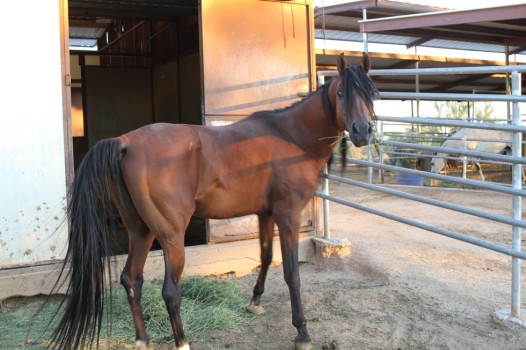Source: the dodo
The first step he took out of his stall was the hardest.
Monty, a horse locked away in a filthy stall for years, did not seem to understand what was going on. He was hesitant and frightened about coming out of his makeshift prison, where the only attention he received was when his owner threw in some hay, food and water. His only friends were the flies that circled and landed on his gaunt frame.

Monty locked in his stall (Michelle Forster)
When his rescuer, Travis Underwood, first saw Monty, he didn’t know what to expect when he opened the gate.

(Travis Underwood)
Monty was one among many horses and dogs found on a 10-acre property in Scottsdale, Arizona, in the summer of 2014. Trisha Houlihan, founder and executive director of Saving Paws Rescue, AZ of Phoenix, had been alerted about neglected dogs on the property, Michelle Forster, a volunteer with the organization, told The Dodo.

(Photo: Michelle Forster)
The woman who owned the property, known only as Donna, had been left with animals after her husband died in the summer of 2014 after a long illness, and everything at the property went into disarray. “Her husband kept her isolated,” Forster said.
According to Forster, Donna’s husband had been breeding German shepherds and owned roughly 21 horses. The widow reached out because she needed homes for two of the dogs who had been severely neglected. When Forster did a courtesy call to check on the dogs and take photos, she had no idea she would find an animal hoarding situation in the process. However, the animals did have food, water and shelter, as required by Arizona law.
Due to the horrible conditions, Houlihan accompanied Forster on a subsequent visit to document the animals. She reached out to Underwood, a longtime volunteer with Saving Paws, for his assistance.

Travis gains Monty’s trust (Lisa Cramton)
Initially, Donna wanted to sell the horses, mainly Arabians and quarter horses. “But the market was saturated at the time,” Forster said. “Everyone was trying to get her to understand that the horses didn’t have the value that she originally thought.”
The horses had been badly bitten by flies, and they had not received any general care. They were not let out of their stalls, had not been exercised, and were denied hoof care, vet care and basic grooming. Although some of the horses were worth money on paper, most were not marketable because they had not been trained and were in bad condition.
Read the rest of this article HERE.
No comments:
Post a Comment